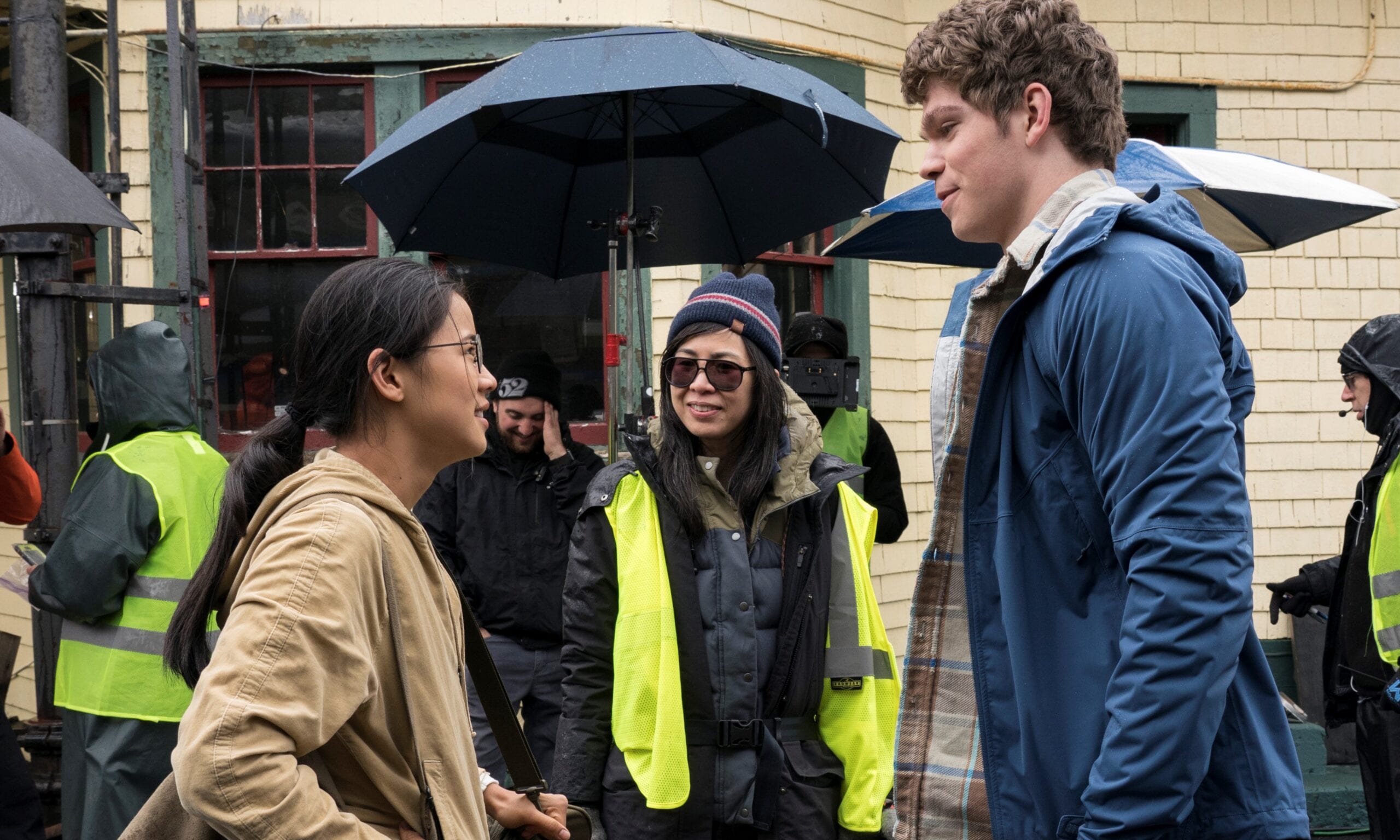When Alice Wu made Saving Face 15 years ago, she wasn’t doing it for herself. Like any good daughter of immigrant parents, Wu wrote it for her mother. The California-based filmmaker’s first feature—a culmination of two degrees in computer science from Stanford University, a stint as a software engineer at Microsoft and a three-month screenwriting class where she wrote the script—was initially intended to be an olive branch.
“I was out as a lesbian and my parents had a hard time with that. Saving Face was a way to try and figure out how to create a connection between us,” Wu says. “I think my longing for that bled through the movie.”
The 2004 rom-com was groundbreaking—the first Hollywood movie to center Chinese Americans since 1993’s The Joy Luck Club. But the story of a young Chinese-American lesbian trying to forge a new relationship while dealing with her widowed, pregnant mother was never as simple as, “Will she or won’t she get the girl?”
“It’s really about whether she can have love and have her family at the same time in an authentic way,” Wu explains.
After Saving Face’s success, Wu retreated from filmmaking to take care of her mother. But a few years ago, she began working on the script for her next feature film. The Half of It, written and directed by Wu, premieres on Netflix on May 1. Like Saving Face, the movie centres on a queer Asian-American protagonist, 17-year-old Ellie Chu (Leah Lewis) who lives with her widowed father in a small town. When Ellie starts helping lovelorn jock Paul Munsky (Daniel Diemer) craft letters and text messages to his crush Aster Flores (Alexxis Lemire), she finds herself in a love triangle—Ellie’s in love with Aster, too.
On the surface, The Half of It appears to be like many other coming-of-age stories. Ellie Chu isn’t even the first Asian-American high schooler obsessed with letter writing on screen (hello, Lara Jean Covey). But Wu insists she never set out to write a teen movie.
“This is a movie with teenagers in it,” she says. “You could take this exact storyline and set it in a nursing home and it would totally work. It doesn’t really matter how old you are—if you have a crush on someone, you instantly regress to being a teenager.”
I spoke to Wu about her two films, being a queer teen in an immigrant family and why she doesn’t believe in happy endings.
I read that Saving Face was inspired by your own coming out. How much of The Half of It was autobiographical?
I think high school was a profoundly lonely experience for me. Now that I’m an adult, I realize it was, in fact, a lonely experience for everybody. But you don’t know that when you’re in high school. You think you’re the loneliest of the lonely and that everybody else is somehow having a better experience than you; that they figured something out. You don’t realize that pretty much everyone feels like they’re probably not going to be able to get whatever that is, that thing that we’re not even willing to admit to ourselves. As people who are queer, we can easily be like, “It’s because we’re queer.” But I actually think that even straight people probably have something that they don’t have language for.
What else went into the script?
By the time I got around to writing The Half of It, I believed it probably would never get made so I just wrote whatever I felt like writing. I put in some of my favourite books, like The Remains of the Day. I put in all my favourite movies, like Wings of Desire. I honestly think the more specific you are—it doesn’t matter if someone’s never heard of Wings of Desire, what matters is that they can feel your love for it—it will remind them of whatever it is they love.
We rarely get to see queer teens as protagonists in coming-of-age movies, yet Ellie never explicitly states that she’s queer. Why did you leave room for ambiguity?
I don’t think she’s aware that she’s queer. In my experience, I didn’t come out to myself until my senior year of college, but I had crushes on girls since the third grade and a crush on the same girl for three years in high school. I certainly was not actualized enough to be like, “Yes, I’m queer.” This is a girl who can’t even handle saying anything about what she wants because she doesn’t think her wants are important. She can see that her family gave up so much for them to have this life, and it kind of went awry with her mom passing away. I don’t think she’s thinking beyond, “This is what I’ve got to do to make sure my dad’s okay.” And then for her, her life is a life in the mind. She has this rich internal life of books and music that’s just purely hers. And in my experience, at least through most of my childhood all the way up until young adulthood, I really lived in my own head because I hadn’t come out to myself.
I understand that completely because despite feeling an attraction to women from a young age, it took me a long time to admit that to myself, let alone openly identify as queer and bisexual. What is it about growing up in an immigrant family, particularly an Asian-American family, that makes it especially hard to come out?
My parents had a hard time accepting I was gay, but I understand. These are not people who ever got to think, “What would I like to do in my life? Would I like to be a filmmaker?” These are people who struggled trying to make sure that, financially, things were going to be okay, who came to a new country that was hostile to them. They’d basically chosen to give up thinking about their dreams, sacrificing their generation for the next generation. So I felt tremendously guilty coming out as gay. That’s why I’m like, I must be super gay, because if there was anything in me that could have been straight or could have met a guy and gotten married and been happy, I would have done it. The pain I was going to incur upon my parents was so unfathomable to me. I think that kind of pressure is something Ellie’s responding to. If her dad had just stayed in his home country, he could have been the shit. He’s clearly smart. He’s handsome. He could’ve crushed it back home. But here he is, stuck in this backwater place, and it’s even more poignant because you see his potential. I think Ellie deeply understands that, so for her, there’s no room to be like, “What is my queer identity?” I think in her world, there isn’t even room to think about who she can like.
There are certainly bullies in The Half of It, and most of the name-calling is directed at Ellie’s surname (kids yell “Chugga Chugga Chu Chu” at her). That being said, there are no actual antagonists in the story, but Christianity is pitted against LGBTQ identity. What role did religion play in your life?
I personally spend an inordinate amount of time thinking about whether God exists or whether there is a larger order to the universe. I didn’t grow up with any organized religion, but my parents were young Chinese immigrants and, I mean, sometimes I feel that being Chinese immigrants is like a religion unto itself. There are strict rules, there’s clearly judgment and there are clearly things considered sin. So I felt like I grew up in this very religious household. I remember we moved into this one neighbourhood where clearly the neighbours did not like us—our house got toilet-papered. We were one of the only people of colour on the block. The only family that was super nice to us was this Mormon family: They had seven children and they said, “Oh, you could come to church with us.” My mom basically offered me up to them, and the next thing I knew, for a few years, I went to church with this Mormon family every Sunday, just like all these blonde people and me.
How do you want audiences to feel when they watch the movie? I felt hopeful for Ellie and Aster, and who they might become.
I’m so glad you said hopeful, because I don’t need an ending to be “happy.” I do need the audience to leave feeling a sense of hope. In the case of this film, it’s like, what is the happiest ending? Is it that Ellie and Aster get together? I actually don’t think that’s the happiest ending. I actually think it seems terrible if they were together and then they had to fight homophobia in this tiny town.
I think a lot about the first shot and last shot of a movie, and the first time you meet Ellie, we see the back of her. It says “The Half of It,” but the irony is we’re seeing her back half. I always knew that for the last shot, I wanted to hold on her face. The idea is that you see the emotions go through her and at a certain point, there’s this quiet confidence and it’s a look that we’ve never seen from her anywhere in the movie. For me, that’s the movie. That’s her journey. We don’t know what’s going to happen to her, but we know she’s going to be okay. And more importantly, she knows she’s going to be okay. I think that is the triumph and the most hopeful ending.
In our latest video, writer-director of Saving Face and The Half of It reveals her favourite queer character, the inspiration behind “taco sausage” and why she considers herself a failed Asian.


 Why you can trust Xtra
Why you can trust Xtra


